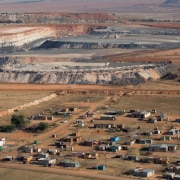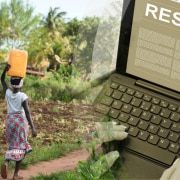|
Getting your Trinity Audio player ready...
|
By Refilwe Chulu
Corporations have increasingly become a threat to human rights over the years. There are several reasons for this, such as corporate goals and targets, which can mean that human rights get overridden so that targets may be reached, harmful operational activities such as excessive use of water or damage to housing, or disregarding the rights of workers, such as freedom of expression.
Even though respect for human rights is not an option, these and many other violations are regularly seen in all business sectors. For this particular article, however, we focus on the mining sector.
Mining in South Africa often takes place in rural areas, where communities’ main source of livelihood and subsistence is derived from their land and livestock. Because of this deep dependence of rural people on the land, mining activities can threaten to disrupt their normal routines and practices and indeed, turn their lives upside down.
Mining activities often force people off their land, leading to land deprivation which severely compromises their abilities to make a living. In addition, communities continue to lay complaints regarding mining companies’ non-compliance to environmental regulations in their operations, which continues to endanger the lives of people and affect the environment and biodiversity, as well as undermine the human rights of rural people. Rural communities across South Africa have resorted to protesting the commencement and continuation of mining activities which have been critiqued for being harmful to the environment and the quality of life of the people living in the precinct of mining activities. There is also dissatisfaction with mining companies’ processes for consultation and gaining consent from informal land rights owners.
Such conflict can continue for years, or quickly turn deadly. In 2012, 47 mine-workers at the Lonmin mine in Marikana, North West, died as a result of police intervening with deadly force in a protracted labour dispute. In KwaZulu-Natal, on the outskirts of Dannhauser, community activists were shot, injured and arrested by the police while protesting against Ikwezi coal mine, for its harmful mining activities which caused air pollution, damage to houses, and the death of livestock. In Xolobeni, a village in the Eastern Cape, community members waged a decade-long campaign to fend off an Australian company that wanted to mine titanium behind their homes without gaining consent from members of the community.
In August 2022, a group of about 100 citizens, under the banner of Mining Affected Communities United in Action, picketed outside Parliament and demanded that the Department of Mineral Resources see to it that mining-affected communities are meaningfully consulted, and that prior and informed consent is obtained before mining operations can commence.
Economic might vs government authority
The economic might of some corporations has eroded the power of states to protect their citizens, especially in developing countries. In 2023, the total revenue of South Africa’s mining industry was R654-billion, owing to the country possessing the world’s largest reserves of platinum group metals and manganese, and some of the largest reserves of gold, diamonds, chromite ore, and vanadium. Not surprisingly, the fact that the mining sector and the private sector in general is the biggest creator of employment in the country, which supports the idea that human rights obligations ought to be regulated at company level.
It is important to note that there is no specific binding legislation in South Africa which directly holds businesses accountable for human rights violations. The UN Guiding Principles on Business and Human Rights (UNGP) call on both governments and companies to identify, prevent, mitigate, and remedy actual and potential human rights abuses. The UNGP is not only a guide to help businesses respect human rights in their operations, but is also a roadmap for businesses to contribute to the 2030 Agenda and the Sustainable Development Goals.
The South African Human Rights Commission has actively participated in advancing respect for human rights by business. Its activities in response to the business and human rights environment in South Africa have largely been informed by the commitments and institutional engagements at the international and regional level in the absence of a domestic binding legislation.
Advocacy for implementation of BHRDD
South Africa can incorporate parts of the UNGP to ensure that companies, businesses, transnational corporations, and business enterprises protect, promote and respect human rights issues (which can be inextricably linked to corruption). The UNGP consists of three pillars, namely the protection of human rights by states, the respect of human rights as a corporate responsibility, and remedies for victims of business-related abuses.
The key elements of company obligations under the UNGP include:
- Conducting business and human rights due diligence;
- Integration of human rights into corporate policies and practices;
- Transparency and disclosure; and
- Stakeholder engagement.
There has been no effort on the part of legislature to codify the Business and Human Rights Due Diligence (BHRDD) principles into any of South Africa’s laws. BHRDD is a systematic and comprehensive approach that businesses ought to be required to undertake to assess and address the potential human rights impacts of their operations, products, and services. In international best practice, BHRDD involves identifying, preventing, mitigating, and accounting for how a company may affect human rights, both within its own operations and throughout its supply chain.
In the case of human rights violations in the mining sector, BHRDD can play a significant role in addressing corruption by promoting transparency, accountability, and ethical behaviour within an organisation. This will mitigate human rights abuses, which are inextricably linked to corruption. BHRDD can also contribute to counter-corruption through risk assessment, supply chain transparency, whistle-blower mechanisms, stakeholder engagement, ensuring compliance with anti-corruption laws, promoting ethical corporate cultures, and ensuring reporting and accountability.
BHRDD plays an important role in the responsibility of states to hold private actors responsible for their violations of human rights. It refers to an obligation of conduct rather than an obligation of result which means that the primary focus is on the behaviour of the duty bearer rather than on the outcome of that behaviour. Due diligence has been defined as “an obligation of conduct on the part of a subject of law”, a breach of which does not consist in “failing to achieve the desired result” but rather in “failing to take the necessary, diligent steps towards that end”. As such, due diligence tends to inquire whether a state has taken reasonable and appropriate steps to prevent or mitigate breaches of international law by private persons. These principles ought to be adopted as part of a company’s social responsibility plan.
It is undeniable that there is a great need to create the necessary checks and balances to ensure that companies, in particular, mining companies, conduct their activities without violating human rights and that they act in a socially responsible manner. States should hold all businesses accountable for human rights violations taking place within their sphere of operation. This will ensure that businesses guarantee that their activities are in line with the spirit, purport and objects of the Constitution; and that there is a human rights approach to how business is conducted within the borders of South Africa.








